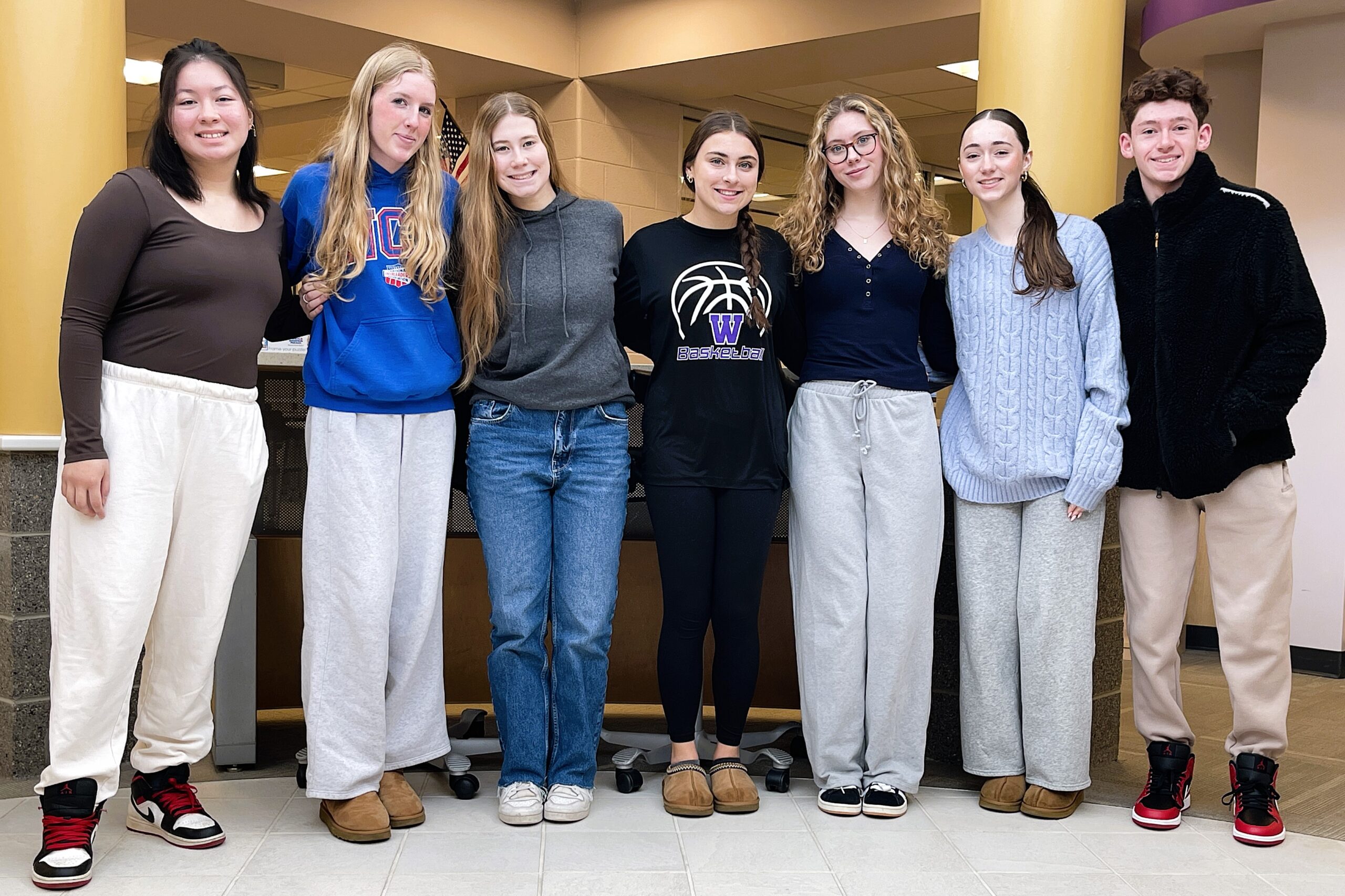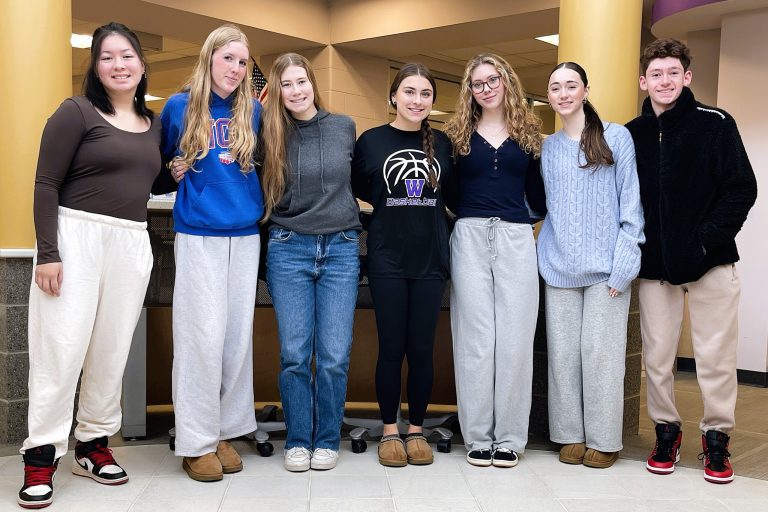This week, the superintendent’s spotlight shines on seven impressive seniors who will complete their three-year, in-depth science research program projects this spring: Reese Berman, Ashley Fitzgerald, Evan Grundfast, Abigail Kadus, Olivia Martino, Angie Ortiz and Caroline Rourke. .
The science research program is one of the most challenging and rigorous academic offerings in our district. It is recognized by the NYS Board of Regents and offered in partnership with SUNY Albany, as part of the University in the High School program. For three years, high school students have the opportunity to participate in the scientific research community and engage in authentic research of their own design. Students develop advanced research skills and life skills such as problem solving, critical thinking, communication, time management and public speaking.
Scientific research students must complete the following:
- Select and study a topic of interest
- Develop research protocol skills
- Read and summarize peer-reviewed journal articles and critique professional scientific articles
- Practice formal presentations of peer-reviewed articles or independent research
- Maintain a professional laboratory notebook
- Building a scientific portfolio
- Communicate with professionals
- Design and conduct original research
- Discuss and analyze the results during conferences
- Write a final research paper
Reese Berman is researching stress among high school academics with his mentor, Dr. Mark Leary, PhD., professor of psychology and neuroscience at Duke University. Reese first became interested in the effects of stress on high school students. She and Dr. Leary then narrowed the scope of their research. She has since completed the data collection and is moving on to the next step.
“My hypothesis was, ‘students who take a greater number of AP courses will experience more stress and lower life satisfaction,’” she explained. “Right now I have completed my research and now I am analyzing my data.”
Reese is a Magna Cum Laude student and plans to study finance in college at a Big 10 school. She has a few college acceptances in hand and is waiting for a few more before making her choice.
Ashley Fitzgerald studied the effects of the ketogenic diet and adenosine on controlling seizures and stopping the progression of epilepsy. His mentor is Dr. Detlev Boison, PhD., vice chair for research and education, department of neurosurgery at Rutgers University.
“I prove that the ketogenic diet, which is eating a high-fat, low-carb diet… will increase the chemical adenosine in your brain, which will prevent epilepsy in your body from getting worse,” Ashley said.
Ashley is a Summa Cum Laude student. Next year, she plans to major in biological sciences, with a minor in Spanish, and continue doing research, en route to her ultimate goal of becoming a physician’s assistant. She gained not only knowledge, but also invaluable skills through the scientific research program.
“I take away the presentation skills I learned; I’ve definitely improved a lot in that area,” Ashley said. “Also, my ability to read in-depth research articles and cite them correctly. »
Evan Grundfast began his project on prion disease diagnostics with his mentor, Dr. David Jaeger, MD, Ph.D., a neurologist at Crystal Run Healthcare. Working with Dr. Jaeger, Evan adjusted his project to focus on a specific type of prion disease called sporadic Creutzfeldt-Jakob disease.
“The human version of mad cow disease, basically,” Evan said. “It’s the same thing, where it causes neurodegeneration. Your brain begins to see its neurons degenerate and die.
Evan has received nearly 1,200 de-identified patient cases from the National Prion Disease Surveillance Center at Case Western Reserve University and is currently analyzing them to determine factors such as age of onset and duration. Evan plans to apply to present his research in competitions at the end of his project. He plans to study pre-med with a minor in business and continue his research in college. Evan appreciated the opportunity the science research program gave him to explore a topic of his choice, as well as the new skills he learned.
“(The program) develops a lot of great skills for pursuing research into the future, having your own goals and being able to figure things out on your own,” Evan said. “It gives you a lot of freedom to just look at things that interest you. »
Abigail Kadus began his project with an interest in examining the effects of sleep deprivation on high school adolescents. She and her mentor, Dr. Arturo Arrona-Palacios, Ph.D., Division of Sleep Medicine at Harvard Medical, refined their project to focus on the relationship between sleep and caffeine in adolescents.
“I wanted to (research) sleep in adolescents, but it’s a very broad area of research, so my mentor suggested I look at caffeine and adolescents, which is a relevant topic for me today,” Abigail said. “We took a survey with all the different questions, and then I met with the Warwick health teachers and was able to distribute it to their seven classes.”
Abigail is also in the analysis phase of her project. She is a Summa Cum Laude student and will attend Rowan University next year to play lacrosse and study biology on a pre-med track. Like her peers, Abigail found the science research program to be a great learning experience, especially for someone following a path like hers.
“Going into college, that will really help me because I can already understand some of these complex papers, working with real data and real human data participants as well,” Abigail said.
Olivia Martino began his project focusing on the association between isotretinoin use and depression risk in adolescent acne patients. Working with her mentor, Dr. Rashek Kazi, MD., PhD., a dermatologist at Crystal Run Healthcare, Olivia narrowed the scope of her research to the correlations between depression and acne.
“I didn’t find enough data to determine whether isotretinoin caused the depression or whether the patients’ depression was caused by their acne,” she explained. She also agreed that in addition to the knowledge she gained about her subject, the useful skills that scientific research helps one acquire will be applicable well beyond graduation. “And as far as the skills I learned, I would say that how to work independently and time management are two important skills. »
Olivia is a Summa Cum Laude student. She is still making her decision to attend college, but plans to major in biology at the school of her choice.
Angie Ortiz worked with his mentor, Dr. Solveig Hanson, a research support specialist in the School of Integrative Plant Science at Cornell University, to evaluate the winter hardiness of pea plants, observing how they handle conditions winter conditions such as frost, air temperature and wind speed. .
“Basically all the different factors that could affect them,” said Angie, who made numerous visits to Cornell during her project and observed interior and exterior samples. “I’m discovering the difference between what field data will give me in terms of frost resistance (or hardiness) and what a controlled environment will give me.”
Angie, another Summa Cum Laude student, loved the science research experience. She believes that this is a program of study that can benefit any student, now and for their future.
“I want to encourage more people to join the course, because it’s so great,” she said. “It gives you the opportunity to pursue something you really like, on your own terms and with who you prefer. It’s very liberating. It can also take you so many places! »
In fact, the course led Angie to realize her love of agriculture. She plans to earn a doctorate in a related field, and in November applied to Cornell University. She heard it in December… she went in! She’s looking forward to putting some of the technical and practical skills she’s learned into practice.
“I had to learn how to code for this, which I’m going to use throughout my life, so I’m grateful for that,” Angie said. “And I learned that even though there are certain obstacles that will never budge for you, you can find a way around them,” Angie said. “You’ll find something even better.” In cases where there is an obstacle and I need help, I have also learned not to be afraid to contact a professor here that I have never spoken to before, or a professor at a other university, I grew up in my…how should I say…in the way I interact with people.
Caroline Rourke focused his project on CRISPR technology, or Clustered Regularly Interspaced Short Palindromic Repeats. CRISPR allows researchers to selectively modify the DNA of living organisms. His mentor is Dr. Evan Merkhofer, Ph.D., assistant professor in the Department of Biology at Mount Saint Mary College.
“My survey looks at the extent to which people are exposed to technology and then the extent to which they accept its use,” Caroline said. “Then looking at the correlation between the two.”
Caroline is now distributing her finalized survey and will collect data until March for analysis in the spring. Caroline is a Summa Cum Laude student and plans to major in chemical engineering in college. She has not yet made her final choice of school.
Like her six classmates in the science research program, Caroline found the experience enriching in many ways, both academically and personally, and particularly highlighted the camaraderie that has developed between them over the past three years.
“I think being together as a group – because we have a pretty big group of seniors – has helped us a lot, because we’re all going through the same thing,” Caroline said. “So just sharing ideas with each other, almost having a team mindset, all working together has been helpful.”
Students will present their final projects at Warwick Valley High School’s annual science research symposium, which will take place in early June. If you would like to learn more about the scientific research program, you can visit this page of the WVCSD program guide.



